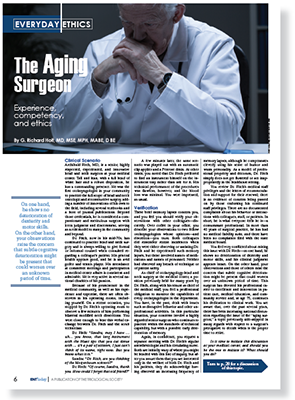 I enjoyed the thought-provoking article entitled “The Aging Surgeon” by G. Richard Holt, MD, (ENTtoday, August 2015). However, I have to take exception with the surgeon’s inability to name instruments during a surgery as an example used to signal a decline in mental function/physician ability. Another explanation for this inability is “flow,” as described by Mihaly
I enjoyed the thought-provoking article entitled “The Aging Surgeon” by G. Richard Holt, MD, (ENTtoday, August 2015). However, I have to take exception with the surgeon’s inability to name instruments during a surgery as an example used to signal a decline in mental function/physician ability. Another explanation for this inability is “flow,” as described by Mihaly
Explore This Issue
December 2015Csikszentmihalyi, PhD, the former chair of the Department of Psychology at the University of Chicago (Flow: The Psychology of Optimal Experience. 1990; New York: Harper and Row).
I went to medical school and did my residency and fellowship at the University of Chicago (sadly, no, I never had the opportunity to meet Dr. Csikszentmihalyi). Approximately two years after completing my fellowship I was faced with a difficult sinus case. My hands flew as the case progressed, and afterward, I felt spent, but giddy, as I realized I was in a “zone” where I lose all sense of self—no sense of bladder, no hunger, no bodily aches, and all sense of time is lost. It is literally painful to be pulled away. A charge nurse asking, “How long will you be? For staffing needs?” can trigger snappish behavior. With utter focus, I frankly am not able to converse with anyone, and communicating the names of instruments becomes difficult. Like the artist with sole control of their palette, one in the zone is better off grabbing instruments rather than asking for them. Such sessions end with a shaking satisfaction, yet significant fatigue. The zone is a double-edged sword, but in the end the benefits outweigh the costs; one comes to seek the zone like an addiction.
I sought an explanation for the zone. Engaging the right side of the brain made some sense and seemed to fit somewhat, but then I discovered Dr. Csikszentmihalyi’s work. He termed the process “flow” and very much described the exact process. As I had imagined, it is the same process in top athletes, dancers, etc. His work focused on the surgeon, even stating how it is a clear example of flow at work.
Dr. Holt’s article was excellent, and observing decline in aging colleagues is certainly a collective effort in which we must engage. We should have difficult discussions with an aging colleague when concern for patient safety becomes apparent. When noting inability to name instruments in particular, though, I would suggest the observer sit back and watch, and possibly be impressed.